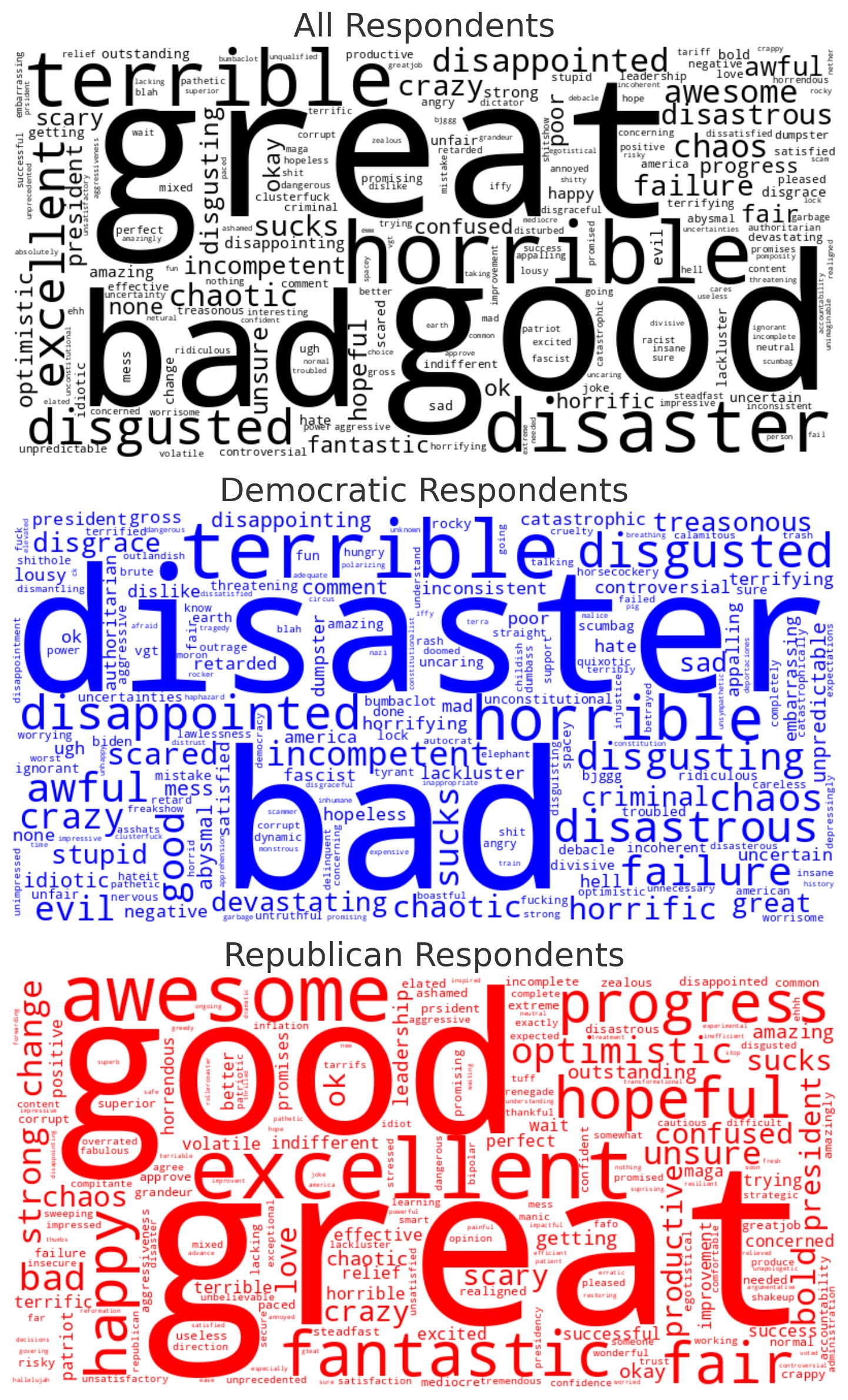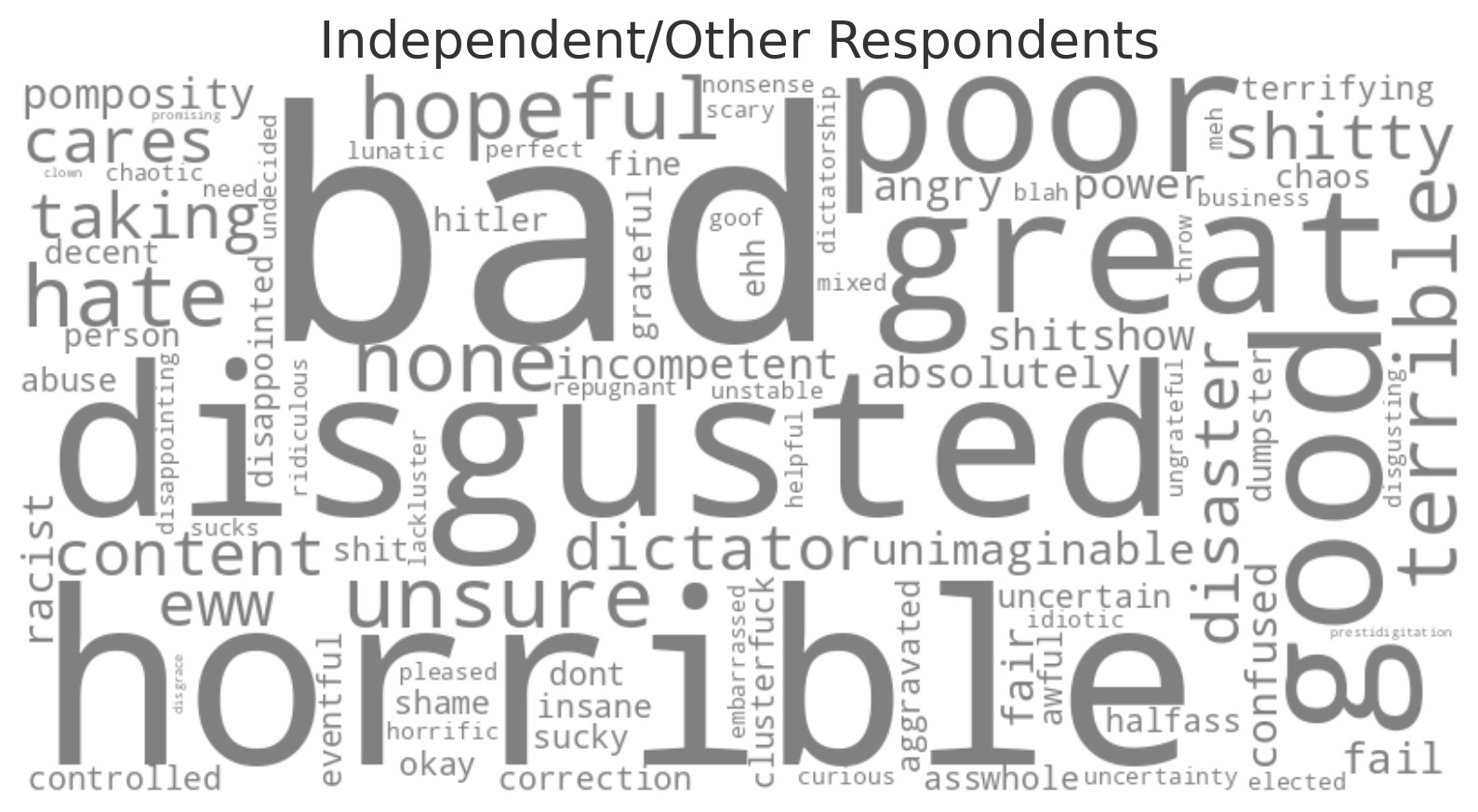What voters think about Trump, in their own words
Republicans said the president is doing "great," while Democrats think he's "chaotic" and "treasonous"
Dear readers,
There are quite a few new polls out this week about Donald Trump’s proposed “One Big Beautiful Bill” (or, as Elon Musk called it on Thursday, “the Big Ugly Spending Bill”). None of them are good for Republicans or the president.
In new polling from YouGov and The Economist, for example, a plurality of Americans (45%) oppose the bill, while just 37% support it. Worse, more think it will raise their taxes than lower them, more think it will raise the deficit than lower it, and, among the most telling findings, the average American believes the bill helps the rich and hurts the poor. 47% of adults say the bill will hurt "the average American," and 51% say the wealthy will benefit the most.
Among working-class voters, whom Trump and White House Deputy Chief of Staff for Policy Stephen Miller said this week they are trying to help, the bill ranks even worse. It is underwater by 10 points among voters making less than $50,000 a year, and by 20 points with moderates and political independents.
But these hard numbers can obscure the nuances of public opinion. In qualitative research, working-class voters express intense displeasure about the bill: An online focus group from the Working Class Project shows that many Americans are worried about rising taxes and about the fairness of the bill. Participants were shown a variety of messages about the bill and picked this one as the most convincing:
It’s not okay for a handful of billionaires to have too much influence over our economy and our government, while so many Americans feel they can’t even afford the basics. We need to get back to rewarding hard work, by paying people what they’re worth, and making it possible to get good education and good health care, instead of letting the ultra-rich get even richer.
To which people responded:
“Rewards for hard work really hits home for me. I know the ‘the rich only want to stay rich and keep the poor down’ agenda has been said for years. It’s sad that it might actually be true now.” – 44-year-old white man from Arizona
“This option is most convincing because there are hard-working Americans that need to get paid what they're worth. And now with the Department of Education gone, I'm not sure we'll be able to raise our children in a good public school.” – 49-year-old Latina woman from Texas
Now, these responses are obviously going to be bad for Trump and the OBBB, given the message the voters are primed with. So that’s not surprising. It’s a message test: The point is not that these are representative of all opinions, just that they would be at least semi-representative of the reaction voters would have if they heard the message.
But I think there’s a lot of utility in hearing how voters feel, in their own words, about politics. It really crystallizes the shape and depth of public opinion. That’s of course what we are trying to do with polling in general, but generally pollsters are forcing people to pick one response out of a set of options they have written themselves. Polls are what people think, in pollsters’ words.
So what can we learn if we get a little less quantitative and let voters express themselves in their own words?
In today’s Chart of the Week, I look at open-ended responses to our May Strength In Numbers/Verasight poll. What do people tell us they think about Trump, in one word?
Support independent journalism!
Become a paying member of Strength In Numbers today and get exclusive posts, early access to data, and more. Your support helps fund our original polling, deep analysis, and data-driven journalism that cuts through the noise.
In two weeks, we'll publish our second Strength In Numbers/Verasight poll. Analysis of that data is only possible with support from readers like you:
Voters in their own words
We asked a representative sample of 1,000 Americans the following question: “What one word or phrase would you use to describe how you feel about Donald Trump’s presidency so far?”
Respondents were then able to give us any answer they wanted. Although we specified one word, we did get longer responses, such as the following (I have not corrected typos):
It is very volatile and he does not seem to have a clear plan to solve american problems.
and:
Refuses to abide by the constitution of our country. Refuses to accountable for his actions. Was found guilty of felony counts that he refused to do time for. He is a LIAR. Hime fixing certain things in our country is not going to make up for his bullying of people that don't go along with his agenda. He telling our children that they can be convicted on felony's and never have to be accountable for the consequences of their actions. He is a Horrible example to young Americans
and also:
Me siento un poco optimista pues creo que el país está avanzando en su recuperación económica, pero no estoy de acuerdo con las deportaciones masivas porque hacen mucho daño a las familias y también influyen mucho en la economía del país.
Rough translation from my two semesters of college Spanish: “I'm a little optimistic because I believe the country is making progress in its economic recuperation/recovery, but I don't agree with mass deportations because they cause a lot of harm to families and also have a lot of influence on the country's economy.”
For longer answers, I used a local large language model to summarize the response in one word. Then I created a word cloud for us to all look at!
In black, you have words from the full pool of respondents, scaled by the frequency of their use. Because responses are conditioned by partisanship, I have also broken out the word cloud by party: In red, I’ve limited responses to Republicans, and in blue, Democrats.
I’ve made this chart super wide so you can zoom in and see the small words. The post continues below the chart.
As you can see, most responses were pretty negative.
Some statistics: Democrats tended to use longer words, on average 6 characters long, while Republicans went a little simpler at 5 characters on average. Republicans also clumped more around the two words “great” and “good,” which is why they stand out in the plot of all respondents’ answers.
There is a lot of partisan agreement, but not complete uniformity. There are a fair number of Republicans expressing negative sentiment, using words like “crappy,” “crazy,” “chaos,” and “confused.” A lot of people also just responded “president.”
Some Democrats also said the president was doing well, but about 97% of responses are negative, so don’t read too much into that.
Trump has a vibes problem
Of course, this exercise is ultimately anecdotal. I just wanted to do it because it’s a fun way to peek inside voters’ heads. And people love word clouds! Regardless of the caveats, it’s worth paying attention to how people talk when we stop asking formulaic questions and let them use their own words.
In this case, the added context of qualitative answers only validates the hard polling data. Trump’s overall job approval rating is underwater by 6 points in the Strength In Numbers average, and we see more negative words than we do positive words.
These open-ended responses help us understand why. It’s not just that the average voter disagrees with Trump; it’s how intensely they disagree. In the word cloud people mention themes of uncertainty, strong disapproval/dissatisfaction (the average Republican word is closer to “good” but the average Democratic word is more like “disaster”), incompetence, and even treason.
At the end of the day, these word clouds can only really serve as something of a vibe check. But the vibes for Trump are just terrible. As a final chart, here’s the word cloud among independents, who are supposedly more measured and moderate than the average voter:
Independents and people with an “other” party affiliation used words like “disgusted,” “dictator,” and “shitshow” to describe Trump’s presidency so far. Someone even said “asswhole [sic].”
I hope you’ll spend some time hanging out here and looking at these word clouds today.
Our June Strength In Numbers survey just went into the field, and we will have even more open-ended text to process and share with you in this newsletter. If you have any ideas for how we can make use of this data, we’d love to hear from you!
And a final reminder to support our independent journalism if you can. Money makes more polls and analysis like these possible in the future.
Happy weekend,
Elliott






Thank you for the excellent anecdotal additions to your work in this piece. I appreciate a numbers guy taking the time to listen in and contextualize data. It brings it home.
I don't believe Trump cares - he'll be able to line his pockets and let his narcissism fly for years. I wonder about republican politicians - they must be more afraid of primaries than general elections.